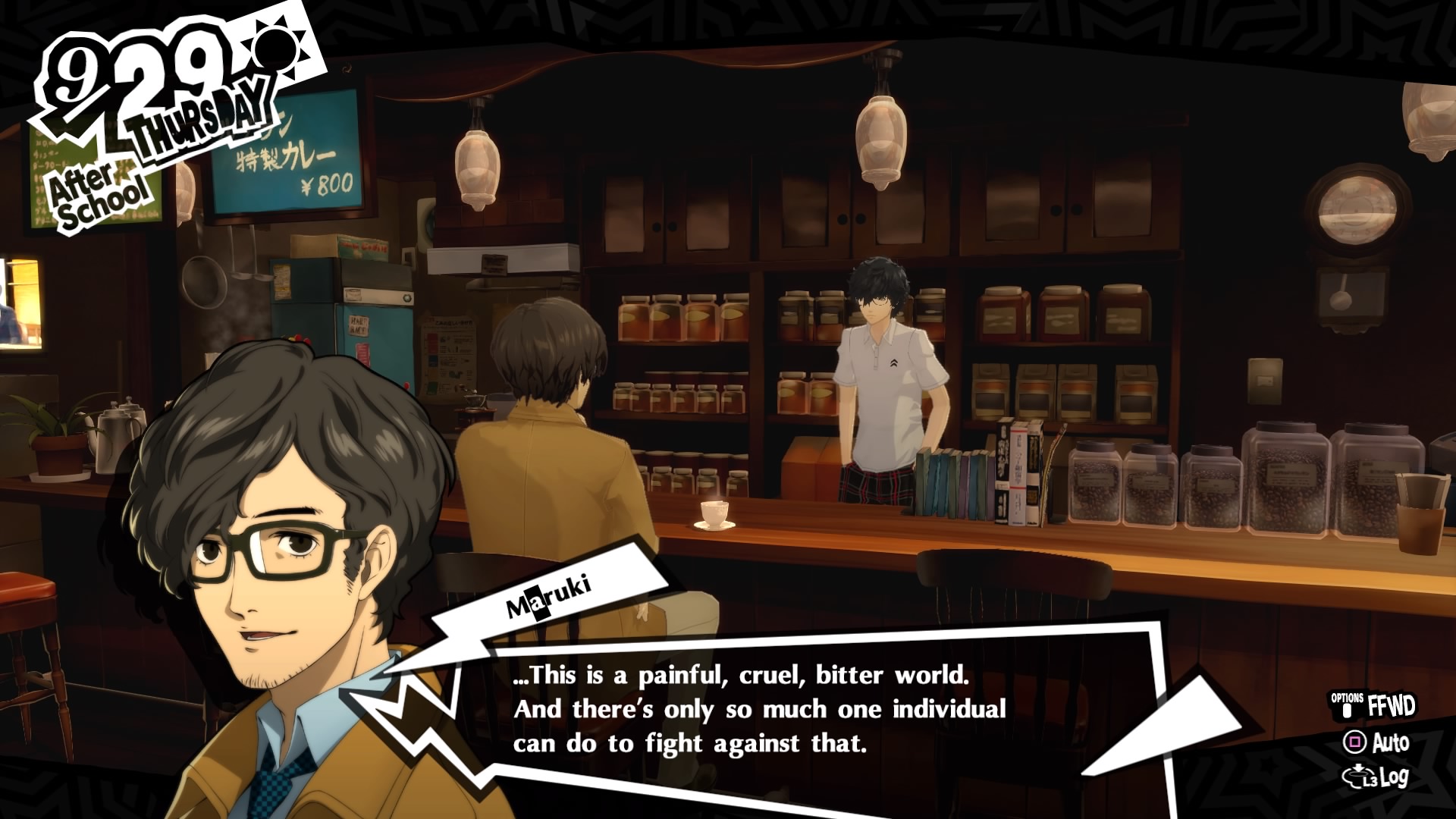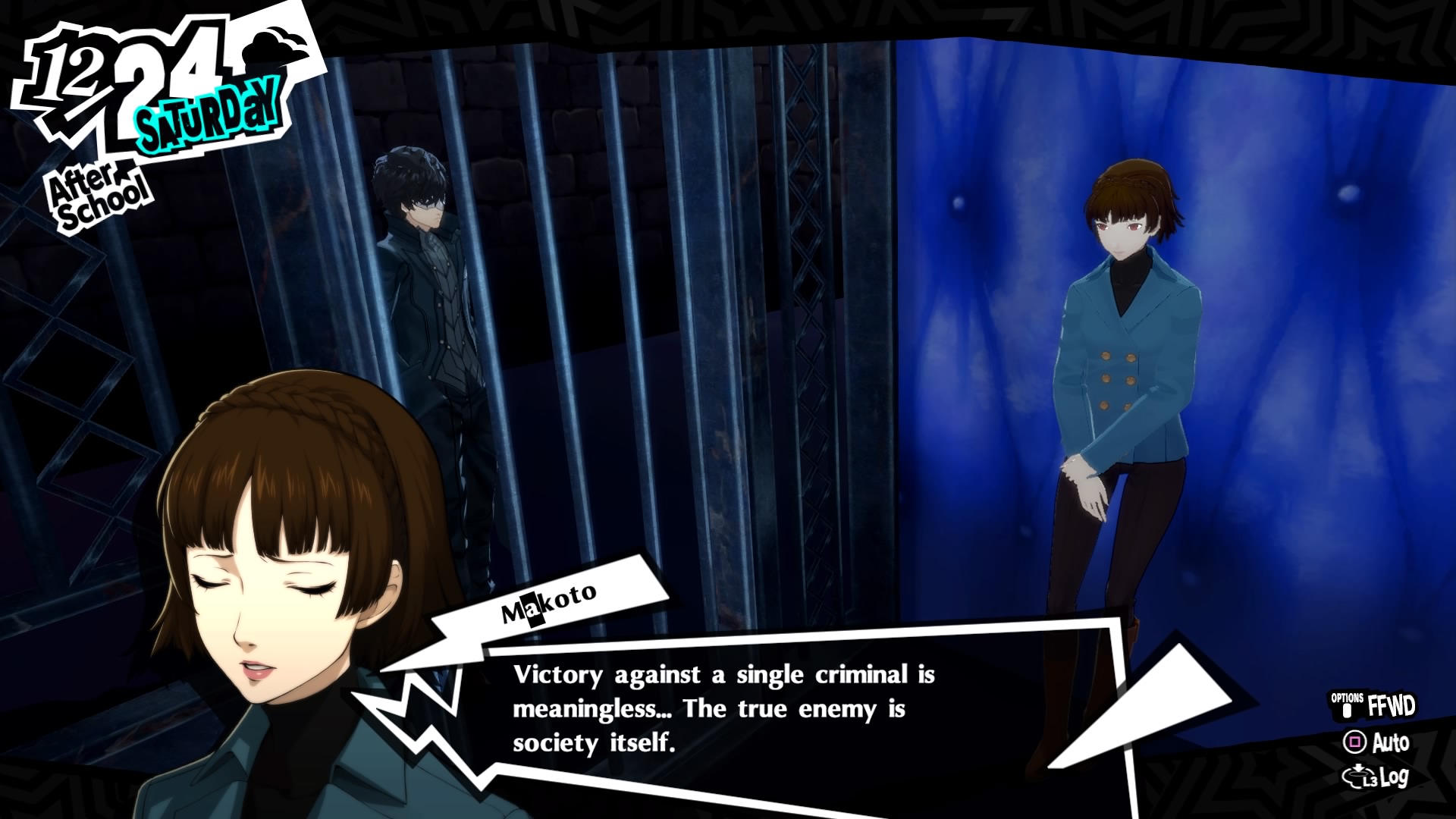Listen up, inmate! (Consider this sentence a major spoiler warning, if you care about that kind of stuff.)
Persona 5 Royal is the best Japanese roleplaying game that isn’t Tactics Ogre. Recently released as an expanded take on the now few years’ old Persona 5, Royal furthers the story of a gang of outcast Japanese teens, each wronged in a different way by an adult or society. While ultimately a criticism of Japan, from the Lost Decade to Fukushima to today’s right-wing Abe government, the specifics of what it is condemning — corruption, selfishness, complicity, cruelty, sexism, and mindless obedience — are… well, baby, they’re universal.
The very basics
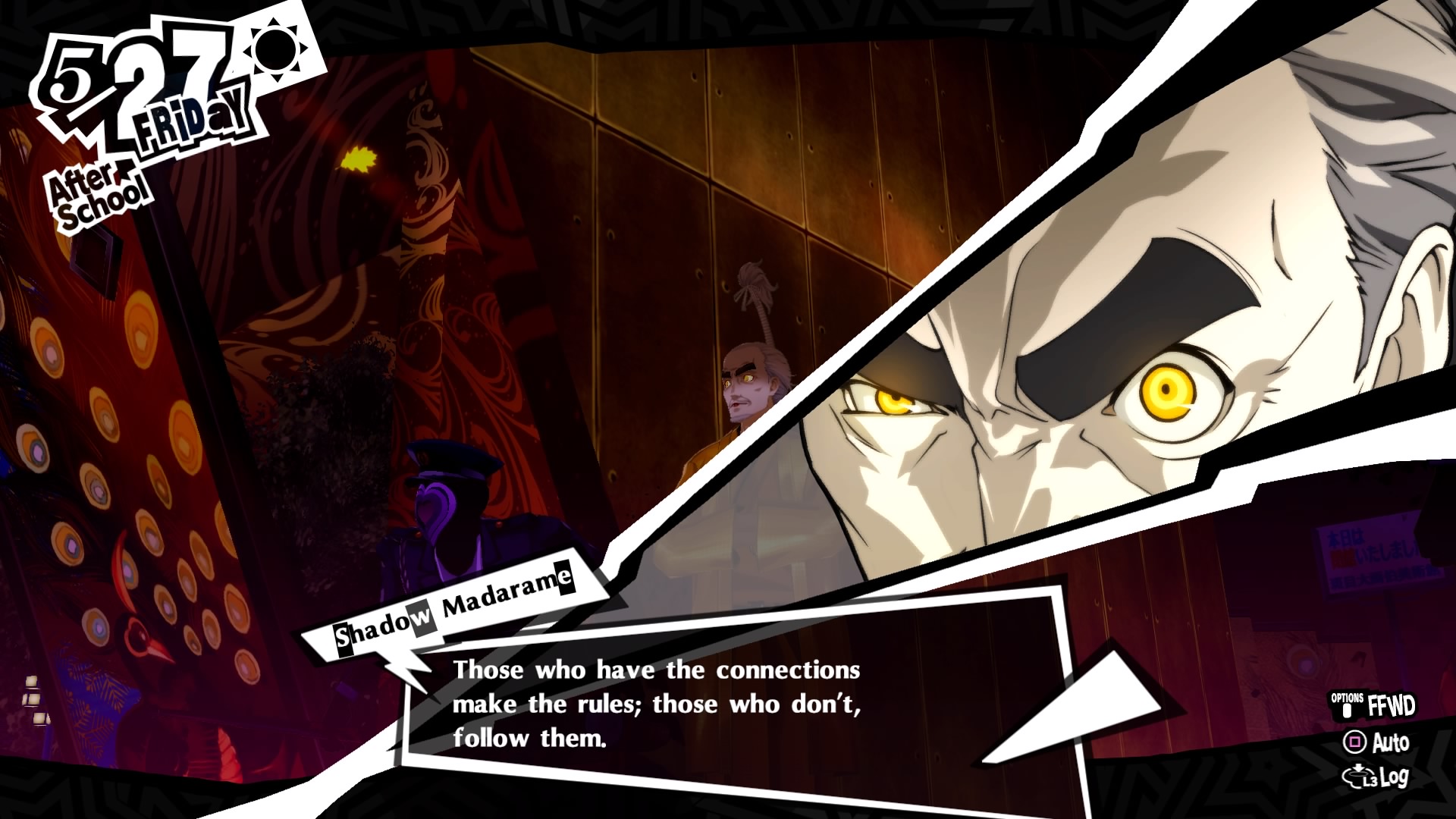
Your guy, the dude you move around the screen and the center of the game’s universe, is Ren Amamiya. You’re a high school student who is sent to live in the attic of an old guy’s small-time Tokyo coffee shop after the up-and-coming politician you stopped from drunkenly assaulting a woman falsely accuses you of attacking him. That’s a mouthful, sure, and it only goes from there. On the way to your first day of class at your new school, you bump into a real creepy gym teacher, Suguru Kamoshida, hitting on a soon-to-be classmate, Ann Takamaki. Just after this, your guy and another new classmate, Ryuji Sakamoto, accidentally fall into Kamoshida’s subconscious — his Palace, where you can see how he really views himself and the rest of the world. Turns out this Kamoshida guy is a real piece of work! Inside his head, you and Ryuji are imprisoned, where you meet Morgana, a talking cat, and a whole lotta monsters. Over your first few weeks at your new school, you and Ryuji and Morgana and Ann battle through these monsters to defeat Kamoshida in combat and steal his Treasure, the real life object that started it all! (His treasure is his Olympic medal.) This theft precipitates Kamoshida’s “Change of Heart,” a recurring mechanic for all other main bad guys after you steal their treasures, wherein he disappears from public life for a little while and then comes back to say, “Damn. That stuff I did? That was awful. And I’m awful. Well! I won’t be so bad now.”
Things escalate for the next 100 hours of gameplay as your expanding team of pals takes down everyone from a chubby mobster with a somewhat familiar bad haircut to the literal Prime Minister of Japan to, wow, what’s this, all of Japan’s apathetic and resigned subconscious (kind of)?
I’m not going to describe and narrate every little thing that happens in a 100 hour game (because that is boring, and not a useful way to understand what the game really is), but this is the basic idea: Extreme villains like Kamoshida, an ex-Olympic volleyball champion, become such because they are warped by intense desire, ego, and, heck, sin. With few exceptions, they don’t know this is happening to themselves and, because other adults either don’t really care or actively benefit from the evil being done by the villains, no one bothers to stop them. Good guys like your guy and Ryuji and Ann are able to summon entities called Personas once they accept how fucked up everything that’s happened to them is. They use these Personas to battle the literal inner-demons of the bad guys and, because this is kind of like Pokemon, you and your guy can capture and meld the bad guys’ inner-demons into bigger and badder ones. There’s also a whole lotta life simulation going on — between taking down corrupt public figures in Final Fantasy-style dungeons, you spend your time in class, making friends, and working part-time jobs.
Also, in one part, a depressed girl asks you to go inside her own subconscious so that you can kill her PTSD — which she imagines in the form of her mom as a giant, flying, and cruel sphinx.
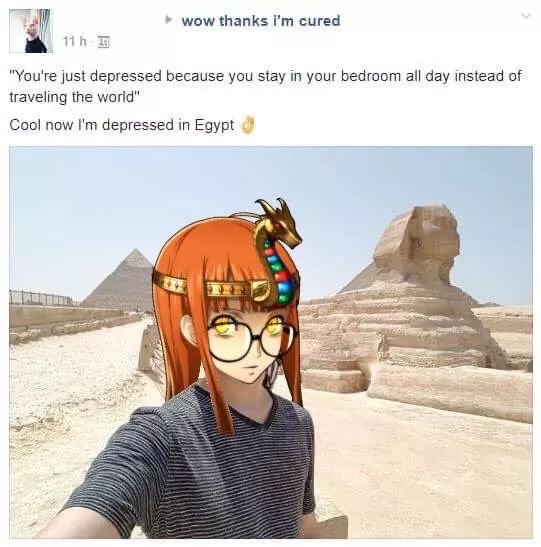
What’s really good
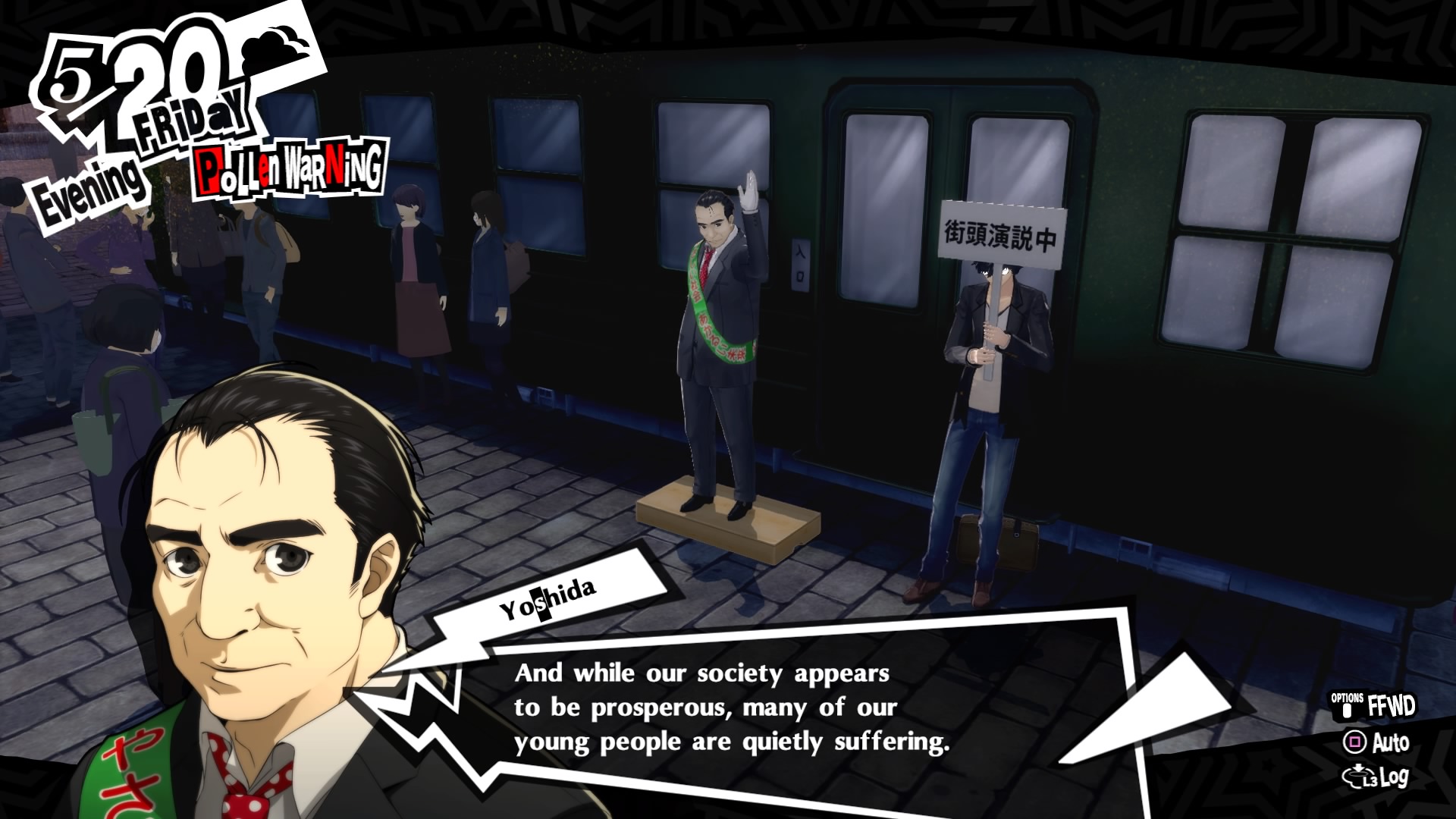 Bernie Sanders...-san
Bernie Sanders...-san
It’s easy to get lost in the game’s bright colors and bouncy soundtrack, to say nothing of its melodrama and sometimes iffy English translation! But the core of Royal is the tenderness with which it treats youth, trauma, and mental health. Your crew of plucky weirdos grows over the course of the game to include a slice of Japanese youth, from mixed-race model Ann and foulmouthed ruined jock Ryuji to the repressed little sister of a Tokyo public prosecutor Makoto Niijima and orphaned gifted artist Yusuke Kitagawa. Each member of the cast has experienced some form of trauma or suffering, the acceptance of which grants them the power needed to right societal wrongs.
While the game’s plot points and characterizations have origins in Japan — some events in the game, like the abusive high school volleyball coach and Yusuke’s adoptive mentor taking credit for his students’ art, are in reference to real world misdeeds in the country — what it most condemns and wrestles with is universal: the powerful cannot police themselves, complicity is both wrong and necessary for true evil to succeed, and victims will always be denied closure without a gang of scruffy teens out there making adults atone for and confess to the extent of their crimes. (This last part is what makes the game special. The kids never intentionally harm their targets in the real world — not even in a Batman kind of way. The heftiest emotional payoff you feel in defeating the Bad Guy comes not from the turn-based combat in boss fights, but after that, when the Bad Guy gets up on stage and says, “I screwed up when I… I’m sorry. I’m going to stop being bad.” Persona recognizes that what many victims want isn’t a declaration of guilt, but an admission of it.)
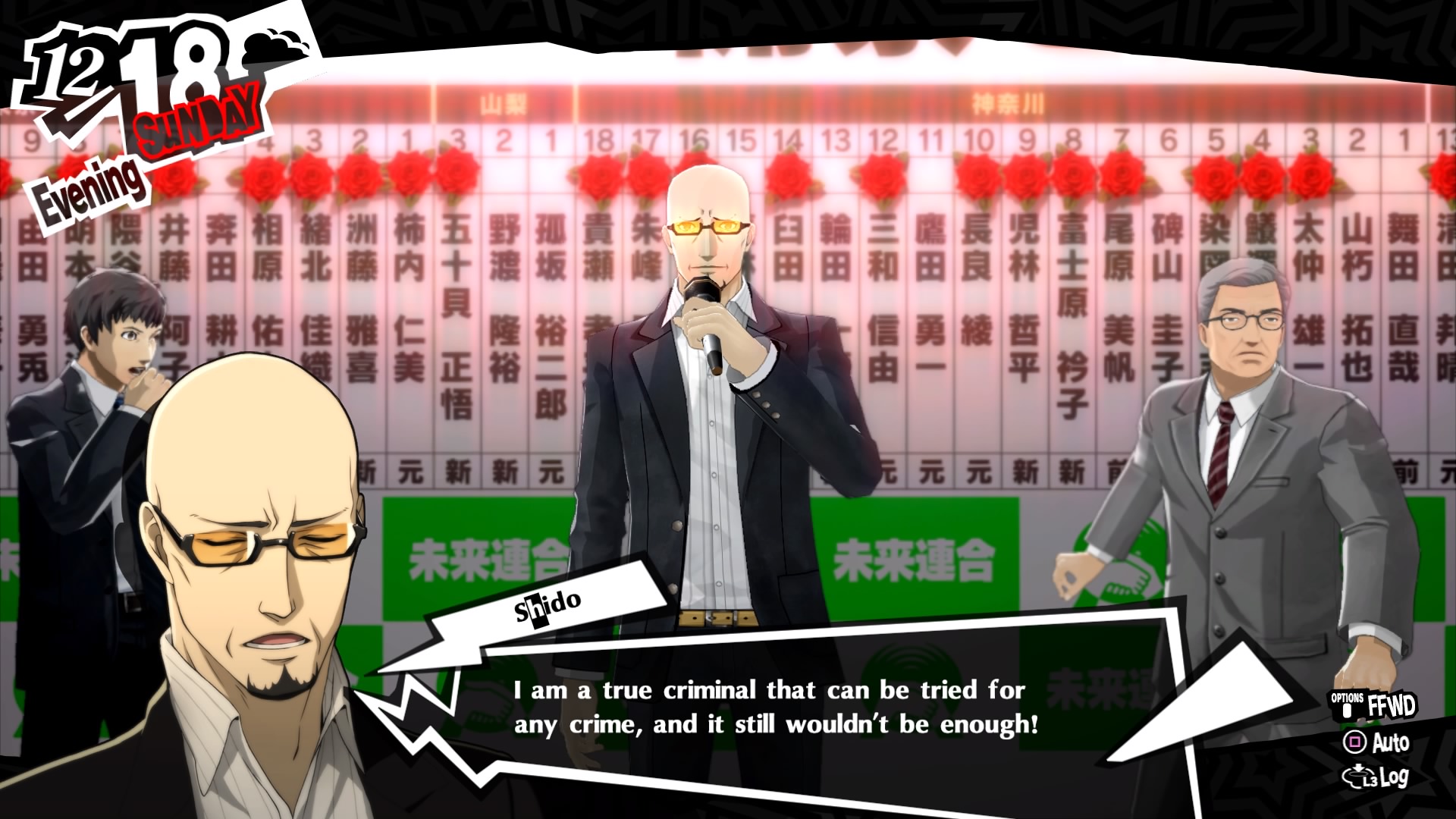
My favorite sequence of events in the game, after the aforementioned entrance into a girl’s subconscious to kill her PTSD, is how it handles Japan’s (Western-seeming!) criminal justice system. Makoto Niijima, your pal from earlier, is little sister to and suspicious of the ultra-competitive rising star public prosecutor, Sae Niijima. Because each villain’s unconscious imbues their “Palace” with a form to protect their treasure, Sae, with her drive to win at any cost, has her treasure locked up inside a giant casino. The house always wins!
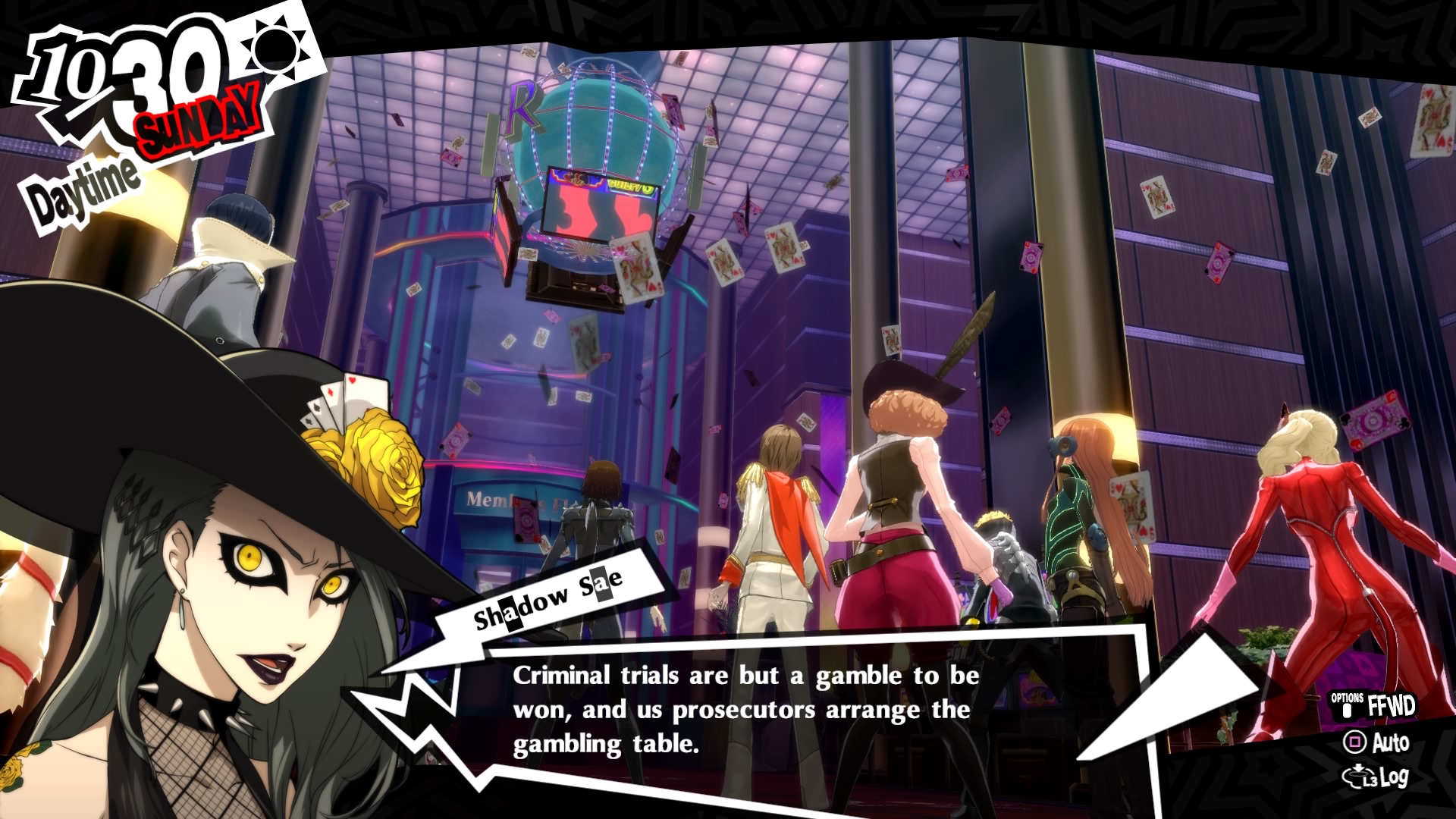
In her subconscious, she refuses to meet with you unless you can win improbably huge amounts in games of chance... that she has also rigged against you. The Palace has a straightforward path by elevator to the top, but to actually take that path means your guy must beat her at her own game. At one point, as you are rigging one of her own card tables to win a payout from, you can see several other tables all rigged against other players. It's an unremarked on, but visually clear, representation of how fucked everyone who cannot cheat the system, or doesn't even know that must be done, is.
The first several months in game time are interspersed with scenes of Sae interviewing you in a jail cell. Once game time catches up with itself, you have successfully convinced Sae that you're not the menace the government has made you out to be and that there are more sinister forces at work. She reluctantly helps free you from your cell. (At the end of the added Royal content, Sae Niijima leaves the prosecutor’s office to become a public defender. A bonus: She tells you her source of pride is no longer her job, but the fact that she worked to ensure you and your pals have a bright future.)
Contrasts
Much of what makes Persona so enjoyable is how different it is from other video games. It's true that the core elements of its actual gameplay -- a catch-'em-all turn-based party lifesim visual novel -- have all been done before. And it's true that, even on its hardest difficulty, it is not a particularly "hard" game. But what makes P5R the definitive JRPG is what it does not have in common with many other games.
- It's a treat for all the senses. From the title screen on, everything is alive. Bright, flashing colors... a slick soundtrack... responsive and flashy animations... Anything you can see, hear, or interact with in the game rewards you. A big thing in games now is Attention to Detail -- are the horse testicles realistic, my dude? Persona 5 doesn't go that route.
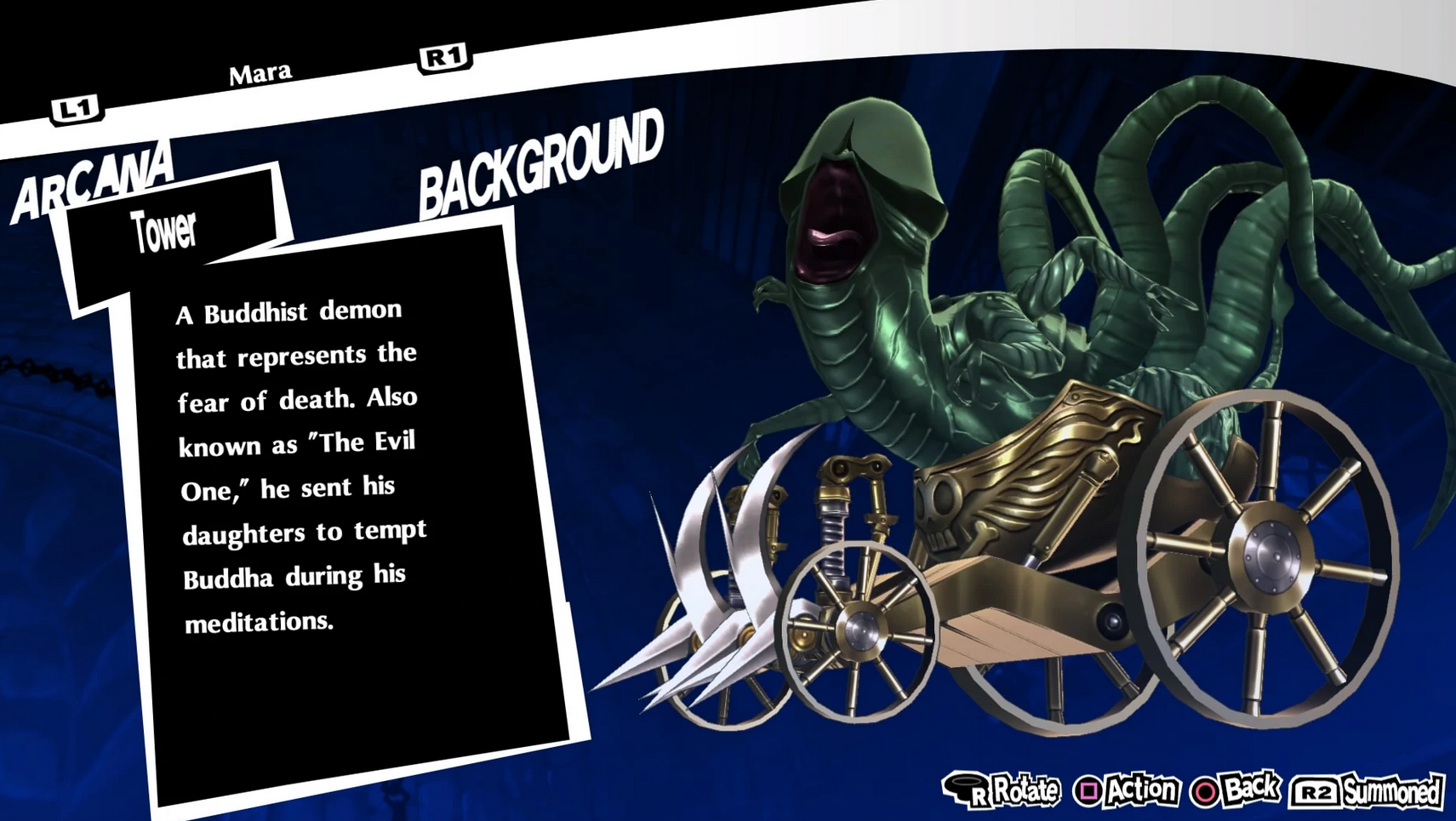
Red Dead 2 is one of the great games, but I can count the number of times I've looked at my horse's lifelike testicles: 0. I take it on faith that they're even lifelike at all. When Mara comes on the screen, though? That'll always get a doubletake out of me. (I believe you first see Mara when you climb the huge stairs out of humanity's subconscious into the sky to kill the God of Control. Just, a lot going on in this game.)
- The game largely has a coherent message (at least until it gets into some of the Royal content, at which point things get fuzzier). Big games are like big movies, in that a bazillion people work on them, developers are afraid of controversy, and there is such a human centipede of content creation that any idea they do land on is ungodly watered down. Big games have a lot of problems. Persona manages to have an opinion, to the point that it beats you over the head with it maybe a few more times than it should. BUT, that is obviously preferable to no opinion or "It's complicated, ya know? Maybe Hitler did have some good ideas..." What's particularly interesting to me about Persona's opinions ("What if 'might makes right' is the source of much of the world's suffering?" for example) is the knowledge of who is playing this game.
Persona 5 is easily an 80 hour long game (if you bother with its lifesim aspects). Persona 5 Royal, with its additional content, is another 20 or so, but to get that extra content, you have to play the game all over again. So, while P5R is not a hard game, it is for hardcores, in that it is very long by video game standards. Japanese RPGs are notorious for being long, but they're also known for attracting weird little freak fans. Persona-adjacent series Shin-Megami Tensei's crossover game with Fire Emblem, Tokyo Mirage Sessions, attracted some of these oddballs when localization removed "vagina bones" from a character's bikini-area. The audience for JRPGs can be unusually reactionary and awkward. These are people known for, at least in the West, decrying "politics in games." It's now routine for games brought over from Japan to inspire one meltdown or another when the localization team makes changes for a Western audience. It is unusual to have a big developer like Atlus have not just Opinions, but allegory like the Ann origin story: When she rejects sports hero gym coach Kamoshida, he assaults her friend, Shiho Suzui, and then benches Shiho from the volleyball team, at which point Shiho tries to commit suicide from the roof of the school. During class! Ann blames herself and, angry that her school has endangered other girls by covering up for Suguru Kamoshida, vows revenge. Grim! It's one of many stories throughout the game highlighting the importance of solidarity -- that is, the acknowledgement that a better world for ourselves means making a better world for everyone -- over complicity. Persona identifies "good" adults by their willingness to condemn other adults. It's really the only thing it asks of them!
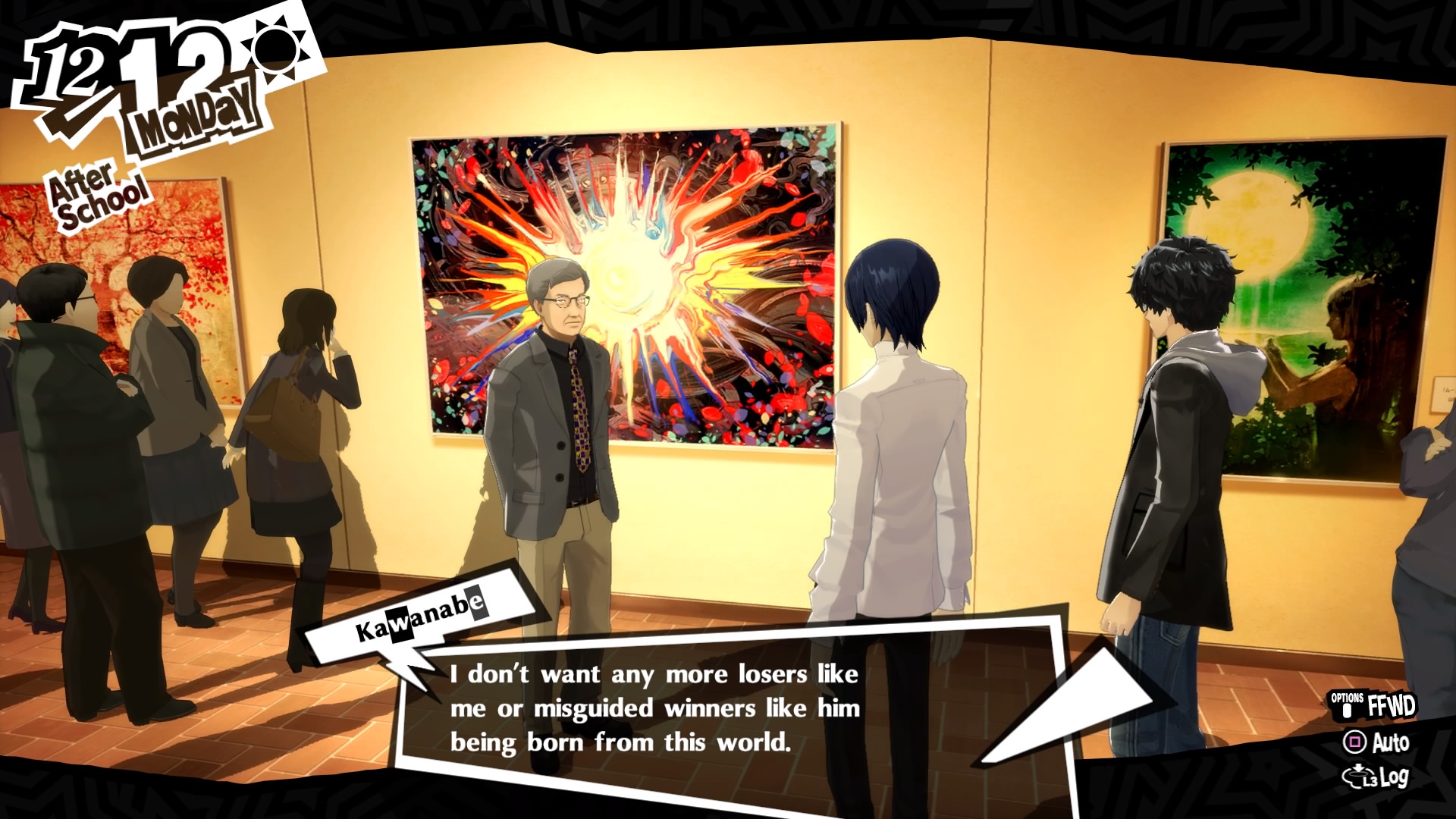
That there is little objection, at least that I have seen, to Persona's politics is a testament to how they have gotten through to an audience that is generally unwilling to accept anything social justice-oriented. To some extent, this game is the Bernie line where he would ask a crowd if they were ready to work as hard for the people in the audience who don't look like them as they are for themselves.
- Persona 5 is light on the repetitious writing and character development common in JRPGs. JRPGs love defining characters by giving them about four traits, two likes, and two dislikes, and then having them repeatedly reference these things, and only these things, for 50 hours. P5R isn't perfect in this department, but boy is it light years less repetitive than, say, last year's Fire Emblem: Three Houses. It at least makes an effort to have characters discuss things other than Their Things. This helps a long game feel much less long.
Faults
Of course, as with anything, P5R has some flaws. Yusuke, the ambitious young artist who goes on to be one of the better characters in your party, starts off with a tremendously uncomfortable series of interactions with Ann. Hot off the heels of the Kamoshida plotline, the jokes and schemes involving her modeling nude for him are a slipup that's hard to make sense of. It is sometimes implied (not in a negative way) that is Yusuke is gay (though later suggested he isn't?), which may be how they tried to rationalize this plot, but it's unnecessary and inappropriate. Also, Ann is in high school. Hello!
More has been written about how the game writes two flamboyantly gay characters that accost Ryuji on a couple occasions. These characters are the game's only obviously gay ones, and they are portrayed as goofball predators. It's very 1993. Royal tries to "fix" them, but they are not even Chekhov's Predatory Gays; they do not further the game in any way. They're just a skit. These two issues sound bad, and they are, but this is in the context of a huge, long as hell game. There's a lot of other stuff to appreciate about the game if you can write this whack shit off. It's not a coincidence that these two mistakes are among the most obviously JRPG trope-y moments in the game.
As mentioned earlier, some of the new content in Royal is hard to parse. The core mechanic of the game is changing the hearts of criminals, fussing with their subconscious to get them to repent. A side activity occurs in Mementos, humanity's collective unconscious, where you and the homies can go to change the hearts of minor league crooks and ne'er-do-wells at the request of their friends, families, and victims. So, key to the game is the idea that you can alter reality and that people can change things (including themselves) for the better. Now, the conceit of Royal's new content is that the school therapist, Dr. Takuto Maruki, is spending the school year befriending you and your classmates while he learns about your suffering, hopes, and dreams, so that he can enter Mementos and apply his Cure for Pain to humanity. He creates another reality, where party member Futaba's mom lives again, rival Goro Akechi isn't dead after sacrificing himself to aid your progress in taking down Japan's corrupt stand-in for Shinzo Abe (Masayoshi Shido), and Ryuji's back on the track team. Also, Morgana is an extremely creepy human boy. The game tries to thread a tricky needle here (why are you allowed to fuck with people's minds but this guy can't? He's literally giving them what they asked for!) and it seems unsure of whether Dr. Maruki is really "bad." At least Dr. Maruki is a good character -- a soft-spoken nice guy who can't get over his girlfriend's PTSD or accept the cruelty of the world.
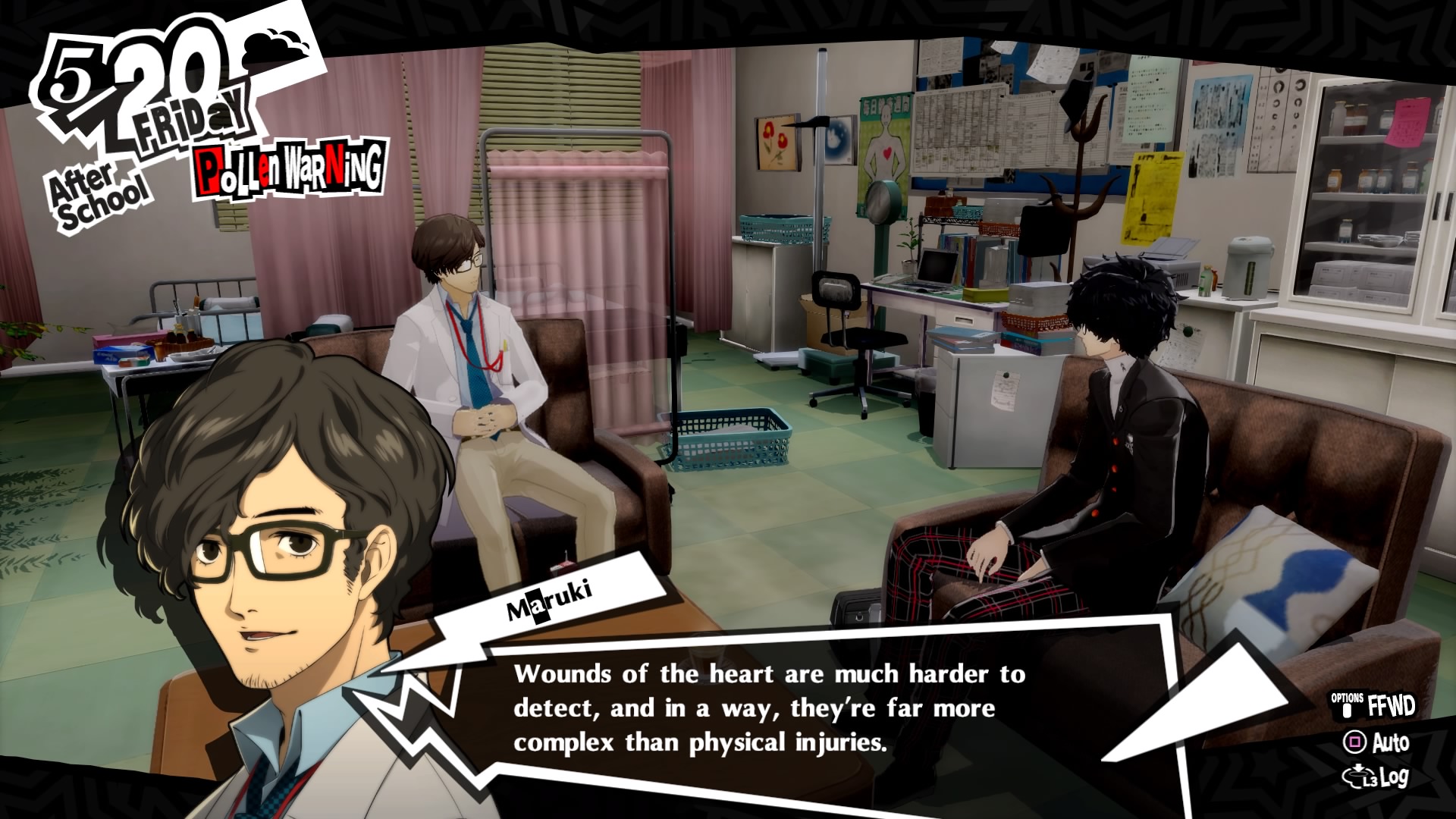
To its credit, the game never gives Dr. Maruki a twist where he is revealed as an actual bastard who has done or wants to do the unforgivable. And the twist it does go with is legit fun. (The twist: P5R's new party member, gymnast Kasumi Yoshizawa, is actually her sister, Sumire Yoshizawa. Sumire, plagued by low confidence and feelings of inferiority, rushes out into traffic. Kasumi attempts to save her, and is hit by a car and killed. Sumire starts therapy with Dr. Maruki and she becomes his proof of concept: He uses his magick powers to cause her to believe she is Kasumi, allowing Sumire to assume Kasumi's status as a gymnast and absolve herself of her sister's death.)
But Persona still can't really figure out why you need to stop Maruki, other than that it Just Doesn't Feel Right What He's Doing. Well, it tries a couple other ways. 1) Goro Akechi, your guy's smug teen ace detective/sociopathic serial killer rival, is brought back to life by Dr. Maruki and he's pissed someone else has the power to force him to be alive. (Daddy issues.) 2) Your pals Igor and Lavenza in the Velvet Room don't want Dr. Maruki screwing around with the Metaverse. (This game is legitimately hard to explain. Igor and Lavenza are introduced early on in the original game as proprietors of the Velvet Room -- the place you go to fuse and strengthen your Personas and learn more about just what is going on. Of course, it's not actually that simple: In the base game, Igor is possessed by Yaldabaoth, the God of Control, who has split Lavenza into twins, Caroline and Justine. By Royal content time, though, they're back to their old selves. And... the Metaverse is the alternate world you enter into to fight the bad guys.)
Overall, Royal's additional content is fun. The new music is chill as hell, Sumire and her twist are great, Dr. Maruki's English voice actor is soothing, and the quality of life changes it makes to gameplay are noticeable. But I was a little on edge until the end of Dr. Maruki's Palace, because I did not want to do a big eyeroll if this all turned into some Randian nonsense about personal responsibility and just remembering to smile a little more.
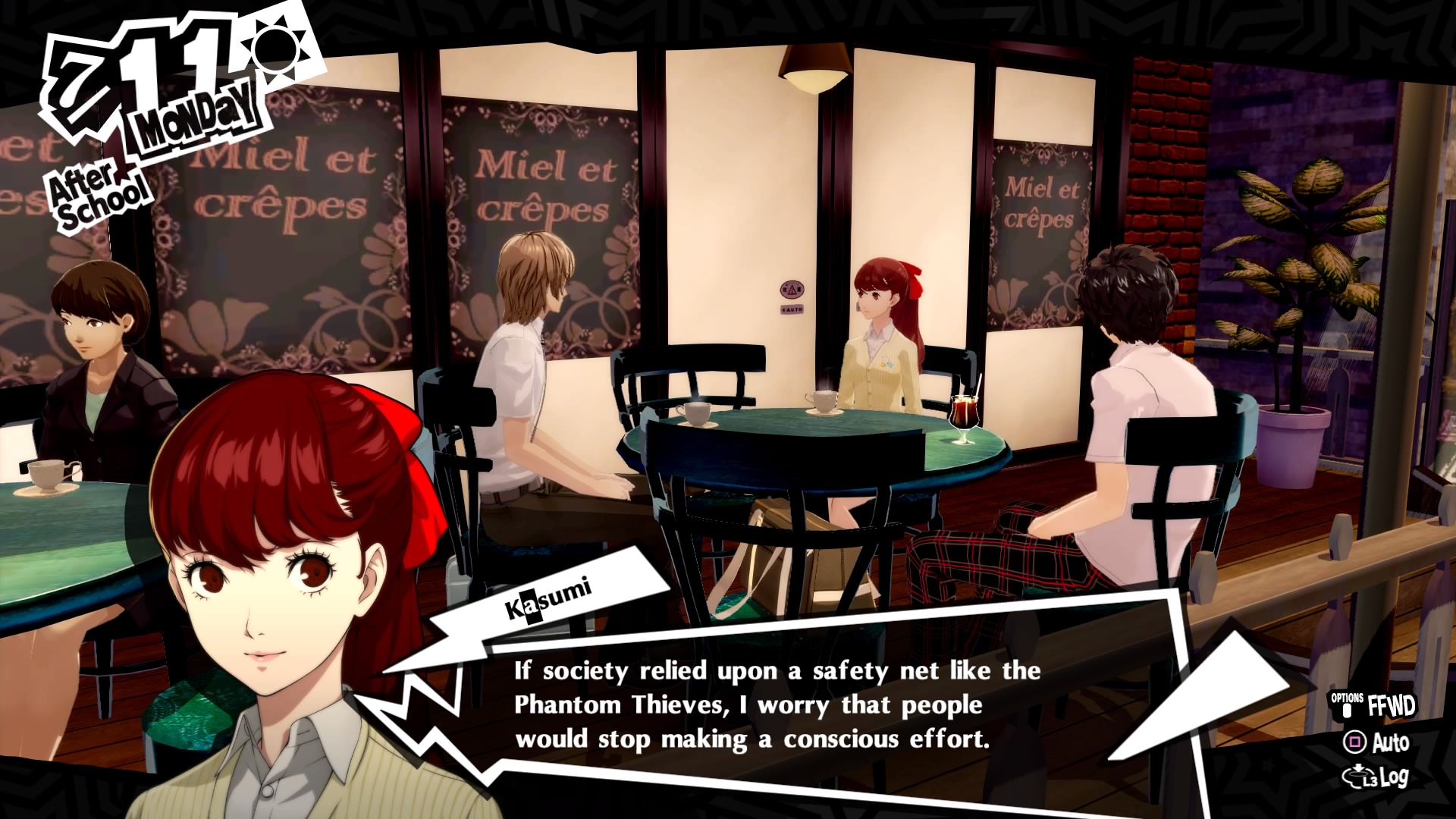 Fortunately, this early scene with Sumire-as-Kasumi did not end up being The Message, but, with the knowledge you later gain of her true identity, it is an ironic joke at her expense.
Fortunately, this early scene with Sumire-as-Kasumi did not end up being The Message, but, with the knowledge you later gain of her true identity, it is an ironic joke at her expense.
I would have liked a more coherent message, but getting into that Brave New World space is a minefield and Royal could have easily been godawful. Given that, that it is "fun" and "enjoyable" is itself a feat.
Akechi, societal differences
Goro Akechi is a divisive figure in the Persona fanbase. He's introduced as a clever, smug teen detective out to catch your gang of hooligans trying to reform society. In one of his first scenes, he references Hegel.
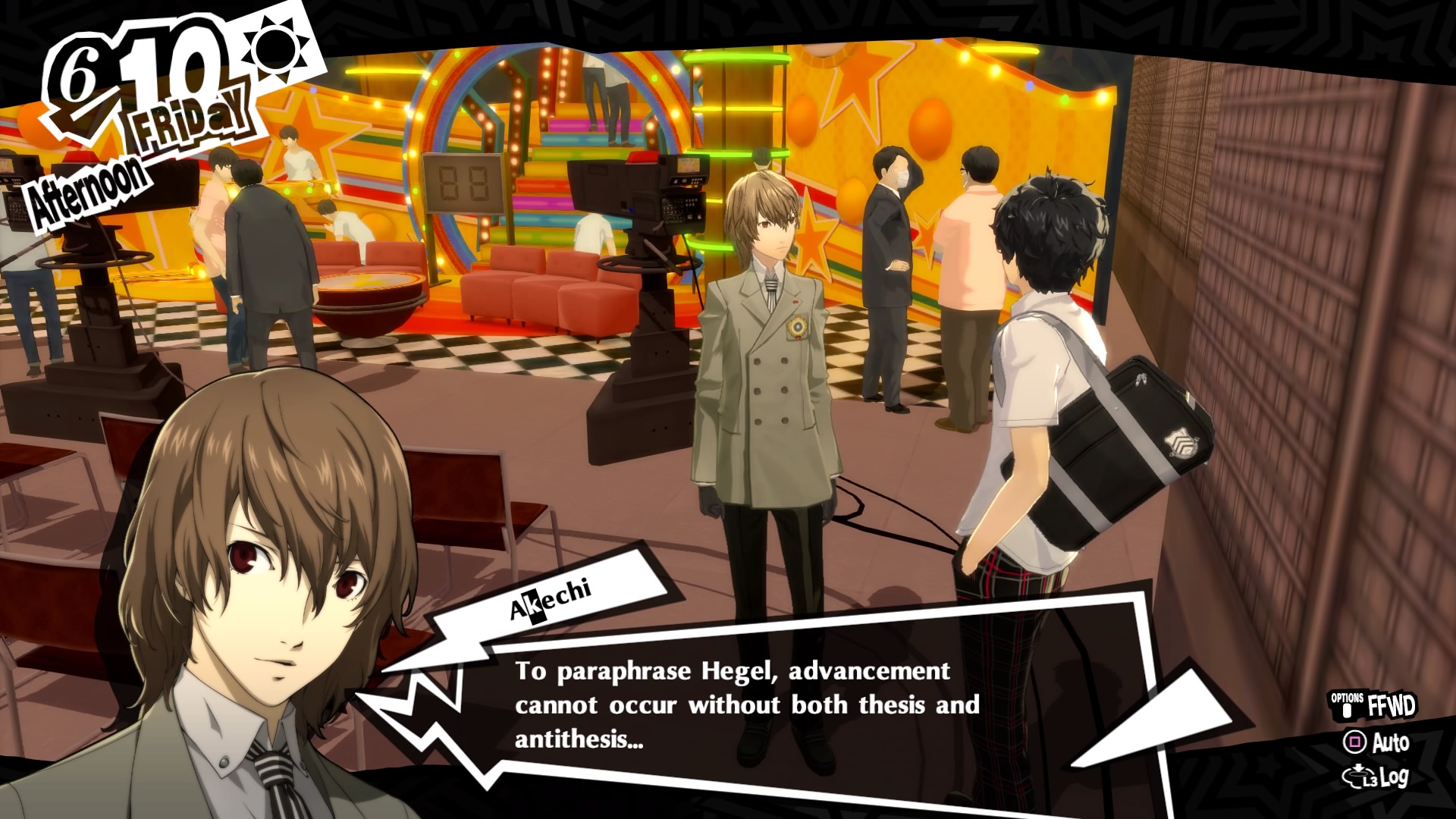 Your guy and Akechi... one might say one of you is the thesis, and the other... the antithesis...
Your guy and Akechi... one might say one of you is the thesis, and the other... the antithesis...
I can't help but love what a tool he is. As time goes on, he's revealed to be responsible for many recent tragedies and crimes in Tokyo. He tries to pin these on you and your buddies, and eventually shoots your guy in the head after you've been drugged and beaten by the cops (but don't worry, your guy saw it coming and only a fake him got shot in the head).
On my second playthrough, I learned that he is a more sympathetic character in Japan. He is a perfectionist and intelligent, destined for great things, but from a low status mother and, gasp, the bastard child of Masayoshi Shido. He has a real chip on his shoulder about that, and there are some actual consequences for it in Japan. His goal, or entire point of living, is to do the bidding of his father until he is able doublecross and murder him. The guy seems to have borderline personality disorder due to childhood neglect and abuse. Other Persona characters are more familiar to Western audiences -- your guy's nickname is literally Joker, his initial Persona is literally named Arsène (as in Lupin), and your band of dashing, enlightened rogues is literally a tale as old as time in the West.
Persona's Western localization had to amp up the hostility of various enemies and frenemies, because the snide coldness of the Japanese characters did not translate to American audiences who are more used to outright aggression and emotion from villains. Akechi's lawful good exterior hiding chaotic evil isn't unheard of in the West, but his origin story is pretty... foreign.
In the expanded Royal content, Akechi's goody-two-shoes facade is fully removed and he's a more straightforward kind of jerk. His reason for dismantling Dr. Maruki's plan to make everyone happy, forever, is unconvincing to me. Akechi's "I would rather die than be made to live by someone else" red pill rants are not relatable to me, but might be more understandable to certain Western audiences. But, then again, maybe not: He is actually willing to put his money where his mouth is and the destruction of Dr. Maruki's palace results in his death (maybe. It's a little bit of an open question at the very end).
Wrap up
As with the previous entry in this series about Hollywood Handbook, Persona 5 is both an escape from and challenge to this moment. In Persona 5, the bad guys get what's coming to them. They're held accountable and made to admit their sins, but the game does not make you root for law enforcement (who are Part of the Problem in the game, as in real life) or punitive measures. Your goal isn't necessarily to hurt the criminals, but to bring them back to some baseline measure of humanity. (In the new Royal content, Dr. Maruki's happy fantasyland even allows for Yusuke to reunite with his cruel, dishonest mentor, Madarame, because it's what Yusuke actually wanted.) P5R makes an effort to have you feel sympathy for characters like Akechi. It explains how true villains are often formed out of their own traumas (each main bad guy's treasure, the thing corrupting their souls, can be thought of as his, or her, own Rosebud, for example), without making the player doubt the need to reform them. It's not perfect, but it is superior in its message and themes to most games. Despite all of its flash and glitz, it's a fundamentally bittersweet game. Once it's over, you instantly remember how fantastical it feels to be in a world where the corrupt and powerful are held to account. Oh well!
